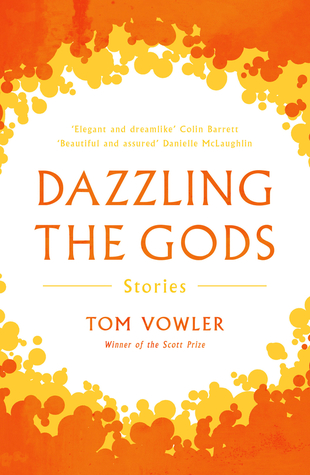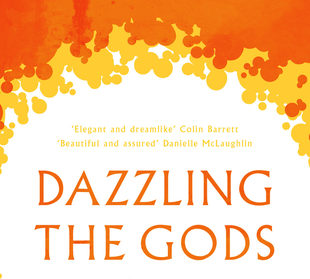Kathryn Eastman reviews the new short story collection from Tom Vowler, Dazzling the Gods, which includes stories such as Debt.
In Dazzling the Gods, Tom Vowler not only makes a welcome return to a form that showcases his versatility and strengths as a writer but he does so without detracting from the characters’ own stories in this, his second collection. Four may be familiar: the title story, ‘The Grandmaster of Gaza’ and ‘Lucca: Last Days of a Marriage’ have appeared in Issues 1, 3 and 6 respectively of The Lonely Crowd, while ‘Scene Forty-Seven’ was originally published online by Wales Arts Review.

Immersing the reader in lives with a palpable sense of loss is a return to a recurring theme from his debut collection, The Method, although he’s doing anything but cover old ground here. Vowler’s unafraid to move around in every sense, offering the reader as dazzling an array of locations as there are characters and where we find them in life. Vowler deftly moves from Ireland to Paris, the Gaza Strip, from London to Lucca in Tuscany, and around the coast, woodland and countryside closer to home while writing about lives not fulfilling their potential or of lives and loves cut short, partners and children missing or absent. Childlessness, in particular, crops up time and again throughout the collection.
Dazzling the Gods opens with ‘Debt’ and is a good introduction to Vowler’s stories: ostensibly a story of a son’s homecoming to sort out his mother’s finances, it’s about another more enduring debt. ‘Musee d’Orsay’ is layered and loaded as a visit highlights the fragility of friendship between two couples while also taking a swipe at how you measure success, snobbery, art and critics. ‘Dazzling the Gods’ opens with a searing description of a heatwave and two people struggling to come to terms with their grief. Brief moments of tenderness and consideration towards one by the other make this story memorable. In ‘The Grandmaster of Gaza’ a broken chess piece symbolises the characters’ missing pieces and damaged existence. ‘Scene Forty-Seven’ is an excruciating and uncomfortable read for as long as the email is left open. The Latin phrases peppered throughout ‘The Offspring Badge’ only serve to underline the heartbreaking motivation behind looking up an ex. An experiment with AI brings with it a realisation about what we miss when the people we love are gone in ‘Romi & Romina’ and how adrift we can feel: “She’d been the guiding lines that bled through my writing paper.” Science rubs up against art in ‘Neruda in the Woods’ when a boyfriend accompanies his girlfriend on a field trip armed only with a book of poetry and realises how ill-equipped he is. In ‘Blowhole’ a naïve woman writes a letter she may regret due to feeling homesick. ‘An Arrangement’ forces a husband to reassess the things “that should have been more prized at the time” and has a pleasing symmetry in its use of swallows. In ‘Lucca: Last Days of a Marriage’, an editor is forced to face up to events in his own life while trying to finish his author’s book. Interestingly, he describes the late author as someone who “troubled his sentences into existence, cared for them as one might a prized possession or one’s child.”
My personal favourite in the collection is ‘Undertow’. There’s a real feeling of weight in the story: from the undertow of the title, the plummet down the cliffs, the weight of water and that of another person, the character’s tiredness, the weight of history and tradition in the local area, and then there’s the house on the clifftop and its associated memories and what to do with it. But alongside it, there is also vulnerability and uncertainty. The fact that the sea is slowly claiming the cliff on which the house stands, “as if the land was exposed flesh, the sea a scalpel.” It’s a burden the main character avoids having to deal with, much like the girl initially. They both drag him down while none has a secure grip on life.
Here is everything that I admire in Vowler’s writing: strong imagery, precise description, especially when detailing the natural world, and a flinty sharpness to the writing. These stories are full of humanity and include moments of real tenderness and kindness, however fleeting, as well as humour. Vowler uses this to good effect, for example in ‘Neruda in the Woods’, when one character knowingly takes an Ice Age reference the wrong way in order to launch his witty “Bloody grey squirrels…” tirade or with the last line of the story in ‘Upgrade’ or in an entire story, such as ‘Banging Che Guevara’, where he alternates each paragraph between three characters whose thoughts don’t tally with expectations or their actions.
There are subtle nods from one story to another: the boys in ‘Fly Icarus Fly’ are “tramping down pathways like arteries” as the junkies in ‘Dazzling the Gods’ once did or may still do. The father in the final story ‘Fireflies’ a potential candidate for the “someone fishing further along, … their focus narrow, outward-looking” which forces the hesitant rescuer to act instead in ‘Undertow’. “A blackbird prospects in the grass” towards the end of ‘The Offspring Badge’ while the reluctant hero in ‘Undertow’ “was not beyond prospecting the line of wrack himself, a source of endless flotsam… all curated by the waves after their immense journeys.”
Prospecting and curating seem apt when imagining how Vowler must go about creating the stories in Dazzling the Gods. This collection of gems certainly deserves your attention and space on your bookshelf.
Dazzling the Gods by Tom Vowler is out now in paperback from Unbound and is available from all good book retailers. Unbound enables authors to write the books they want and readers to help fund the books they would like to read by pledging what they can afford for one of a series of bundled rewards.
For more reviews on Tom Vowler’s writing click here.
Kathryn Eastman is a writer and book blogger living in South Wales. She’s currently Writer in Residence at Pontypool RFC as part of the club’s 150th-anniversary celebrations in 2018/2019.












